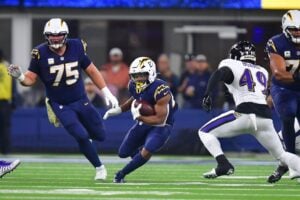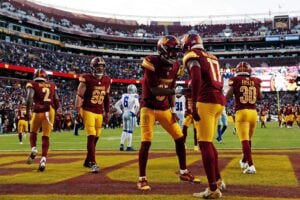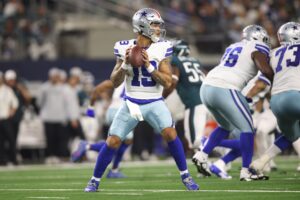As most of you probably know by now, Los Angeles Chargers running back Melvin Gordon wants a new contract. And he is threatening to hold out through training camp and possibly into the regular season if he doesn’t get it. And he wants to be traded if the Chargers won’t pay him. How should the team handle this situation?
Well, first let’s go over the options. First, there’s giving him the deal he wants (along the lines of Todd Gurley and Le’Veon Bell). Then there’s the option of trading him. And finally, there’s doing nothing and waiting to see if Gordon shows up eventually – whether that’s at the end of preseason, by Week Two, or not at all. The last option – waiting him out – is the best out of all those.
The Los Angeles Chargers Should Not Pay or Trade Melvin Gordon
Why Not Pay Him?
The first option was paying Gordon the deal he wants (which would probably be in the neighborhood of $15 million a year). Before we discuss the value of running backs, there’s one other thing to consider: the Chargers are cheapskates. They never hand out mega-deals. Regardless of whether we think he deserves it or not, the Chargers are not going to overpay Gordon.
And now there’s the elephant in the room – are running backs even worth that kind of money anymore? The fact is that running backs can be interchanged relatively easily these days. Last year we saw James Conner, Damien Williams, and C.J. Anderson all come in for their respective starters and do quite well. And the other problem is that running backs on average have a much shorter shelf life than most other positions. Why overpay somebody that may not even play an elite level for the duration of that contract? It almost becomes easier to just recycle out running backs in the draft. Sometimes there are special running backs where it could be worth it, but when even a guy like Gurley can be injured and a backup can literally come off the street like Anderson and be key in them getting a playoff win, that doesn’t exactly do wonders for the market value of running backs.
Gordon is 26, so he’s already probably two-thirds of the way through his career. Even if the Chargers were willing to pay him, they should probably save the money for Joey Bosa or Keenan Allen, who will likely be expecting big contracts as well in the near future.
The Chargers Backups
So who would Gordon be interchanged out with if he wasn’t on the field this year? The main answer would be Justin Jackson. There’s also Austin Ekeler, but he’s better as a receiving back than a runner. Jackson would do just fine in the stead of Gordon; he showed some nice ability last year as a backup and also starter in the few games where Gordon was injured. He picked up 206 yards and averaged 4.1 yards a carry with two touchdowns.
There might be apprehension about whether Jackson could handle being the main starter. The thing is, he actually already has – in probably the biggest game of the regular season during primetime, no less. In the Week 15 game against the Kansas City Chiefs that ended with that epic winning two-point conversion, Jackson actually was the starter. Both Gordon and Ekeler were out. Jackson got 58 yards on 16 carries and a touchdown – not spectacular, but he held his own. And more importantly, the Chargers got the win.
Gordon Has Little Leverage
The idea for Gordon is that he is an elite level running back and that the team would suffer without him. The former is mostly true; the latter just isn’t. It’s a lot like the Le’Veon Bell situation with the Pittsburgh Steelers last year. As good as Bell was, the incentive to pay him disappears a lot when the backup comes in and also performs at a high level. (Yeah, the Steelers missed the playoffs, but that certainly wasn’t Conner’s fault.) Jackson was the starter in a hugely important game late in the season and played good enough to help his team win (though that win was more on the strength of Philip Rivers and Mike Williams). As good as Gordon is, there doesn’t seem to be incentive to overpay him when they can still beat a top AFC team like the Chiefs with Jackson. Keep in mind that at the time he was technically a third-string running back.
Now, this doesn’t mean that it wouldn’t be nice to have Gordon instead. It certainly would. And that’s why they shouldn’t just trade him either. Instead, they can just ignore Gordon for now. Because the other thing to keep in mind is that Bell sitting out the entire season last year was a rare situation. Historically, it’s unlikely Gordon would do the same thing. It’s more likely that he continues to holdout and threaten to not play… and then shows up after missing one or two games.
Last Word on Melvin Gordon
The fact is, Melvin Gordon just does not have the kind of leverage he thinks he does. The team would not suffer dramatically (if at all) without him around. And it’s not that likely that he would sit out the entire season. This kind of tactic usually ends up being a bluff. And the Chargers should call that bluff and see what happens. If it turns out that Gordon really wasn’t kidding, then there’s probably not as much harm done as one might think. And then they can address the Gordon situation next off-season when they’re more prepared for it.
Main Photo:
Embed from Getty Images






